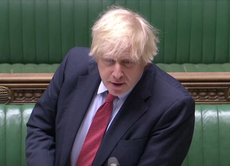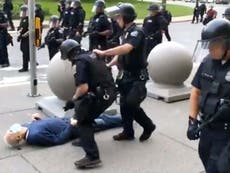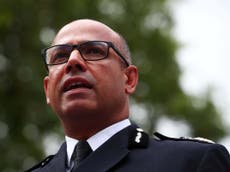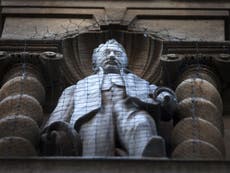Politicians’ responses to the Black Lives Matter protests have taught us a lot – Boris Johnson in particular needs to do better
The prime minister has a duty to take a hard look at the racial inequalities which still plague the country

How politicians react to unexpected events often reveal a lot about them. The response to the Black Lives Matter (BLM) demonstrations in the UK, following the death of George Floyd, is one of them.
When Boris Johnson eventually spoke, he went Trumpian by saying last weekend’s anti-racism protests were “subverted by thuggery”. It was the Conservatives’ default position to make the issue one of law and order, a card that Priti Patel was desperate to play. True, she knows what it is like to be a victim of racism.
However, the home secretary overstepped the mark by intervening in what should have been an operational decision for the police on whether to stop Edward Colston’s statue being toppled in Bristol. Patel rebuked Andy Marsh, the chief constable of Avon and Somerset, telling him she wanted those who pulled down the statue to be prosecuted. Imagine the media and political storm if a Labour home secretary told police who to prosecute.
Johnson realised his initial response was too one-sided after Rishi Sunak rightly adopted a more conciliatory tone. The chancellor said: “As a British Asian of course I know racism exists in Britain. And I know people are angry and frustrated.”
Thankfully, Johnson decided that he didn’t want to be Trump after all. In a piece and a video for The Voice, he acknowledged the “cold reality” of racial injustice and discrimination in the UK.
The Tories were not the only ones put on the spot by the BLM demonstrations. Keir Starmer showed a better understanding than Johnson of the UK’s unfinished business on racial inequality. But he angered left-wing MPs by refusing to back the Bristol protestors.
Starmer’s office told Labour MPs that while the Colston statue should have been taken down years ago, the line to take was: “I’m not going to condone vandalism. Any protest must be done peacefully … it is right that the police investigate and we should let them do their jobs.”
Not all of them got this memo. Clive Lewis told BBC Radio 5 Live those who removed the statue should not be prosecuted, which would be “a waste of police time”. Inevitably, Jeremy Corbyn took a different line to his successor, saying it was “understandable” that the people of Bristol had taken action.
Among left-wingers, there was disappointment that Starmer had failed to live up to assurances by his supporters during the Labour leadership contest that he is a man of the left. But the controversy reveals that Starmer’s priority is not making Labour feel good about itself, but winning back the working class voters wooed by Johnson last December, who are more likely to view the protests as a law and order issue. In Labour’s perennial debate about whether to appeal to Hull or Hampstead, it is clear where Starmer is heading.
For now, Johnson has a more immediate task than the new Tory voters in the north – to try to win the confidence of the Bame community. It won’t be easy after his unfortunate start, and he will need more than mere rhetoric.
A timely reminder of the scale of the task comes today from the government’s social mobility commission in a report showing 45 per cent of children in Bame families are in poverty, compared with 26 per cent in White British families.
Johnson will need a much more convincing response than his government has managed to the deep racial inequalities in health exposed by coronavirus. I haven’t heard a credible explanation from ministers on why a section based on consultations with 4,000 Bame groups by Professor Kevin Fenton was omitted from last week’s review by Public Health England (PHE), which understandably angered Bame people because it failed to make firm recommendations.
Fenton, PHE’s director of health and well being, provided a big clue why in a speech in Hackney last night. His soundings suggested the bigger coronavirus threat came from economic deprivation; occupational risk and comorbidities such as diabetes. But crucially, Fenton added a fourth reason that ministers are clearly less keen to discuss: “structural issues including racism, discrimination, stigma and distrust.”
For once, Johnson should take a leaf out of Theresa May’s book. She commissioned the government’s first race disparity audit in 2017, which at least shone a light on the scale of the problem. There is never going to be a better time to act on it. Johnson doesn’t need yet another review, but some specific measures. Health and education would be good places to start given current events.
Above all, Johnsonian slogans like “levelling up” and “one nation Conservatism” must amount to much more than a plan for the Tories to hang on to their new working class seats. The prime minister needs to respond to the racial inequalities which still plague the country.







Join our commenting forum
Join thought-provoking conversations, follow other Independent readers and see their replies